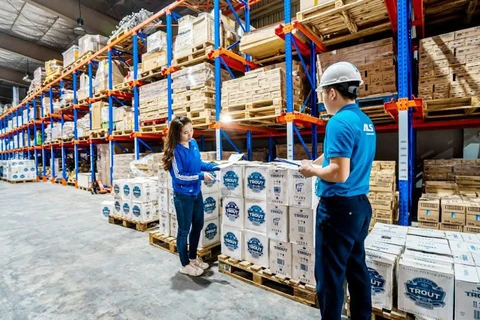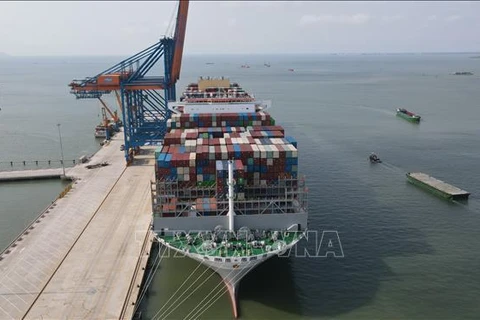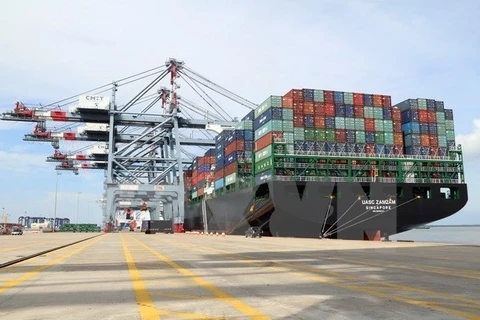HCM City (VNA) – The development of logistics infrastructure, improvement of loading and storage capacity, and formation of a regional – level logistics service centre will help Vietnam better embrace the upcoming global supply chain shifts, experts said at a logistics forum held by the Ho Chi Minh City Logistics Association (HLA) in the city on November 29.
At the event, themed “Shifting Supply Chains: Prospects and Challenges”, Nguyen Cong Luan from the municipal Department of Industry and Trade, described overloaded and degraded roads – the main means of transportation in Vietnam – as a challenge for the country’s logistics activities.
Only 20% of roads in Vietnam meet the requirements of the logistics sector, while more than 50% of them are in bad conditions, posing high risk for the transportation of goods, he said.
Although HCM City is a leading logistics hub in the country and the region, with 2,700 enterprises providing professional logistics services, accounting for 54% of the country’s total number of firms, there is no large-scale logistics centre with advanced technologies built in the city.
Statistics from the HCM City University of Transport, the city is now home to only 1,500 warehouses with 30 standard cold storage ones, failing to meet the market demand.
Luan said it is necessary to branch out transport and logistics infrastructure in the southern economic hub through calling for investment in six logistics centres in Thu Duc city and Binh Chanh, Cu Chi and Nha Be districts.
He also suggested that national- and international-level logistics systems should be developed in tandem with sea ports, airports, international border gates, key economic corridors and inter-regional trade routes in HCM City and Binh Duong, Dong Nai, Ba Ria – Vung Tau and Tay Ninh provinces.
 Vietnam has been ranked in the top 10 places in the 2023 Agility Emerging Markets Logistics Index compiled by Agility. (Photo: VNA) Vietnam has been ranked in the top 10 places in the 2023 Agility Emerging Markets Logistics Index compiled by Agility, one of the world’s top freight forwarding and contract logistics providers. The country is at the 10th place, up one spot compared to the previous year. Among the Southeast Asian countries, Vietnam is in the fourth place, behind Malaysia, Indonesia, and Thailand.
Vietnam has been ranked in the top 10 places in the 2023 Agility Emerging Markets Logistics Index compiled by Agility. (Photo: VNA) Vietnam has been ranked in the top 10 places in the 2023 Agility Emerging Markets Logistics Index compiled by Agility, one of the world’s top freight forwarding and contract logistics providers. The country is at the 10th place, up one spot compared to the previous year. Among the Southeast Asian countries, Vietnam is in the fourth place, behind Malaysia, Indonesia, and Thailand.
According to the World Bank, Vietnam ranks 43rd in the logistics performance index, and is in top five in ASEAN in 2023.
Giang Vu, Co-Chair of the American Chamber of Commerce in Vietnam’s Manufacturing Committee, highlighted free-trade agreements have created numerous opportunities for Vietnam to engage in the global supply chains.
Improvement in working conditions and environmental protection, as well as promotion of the circular economy are among the bold steps that Vietnam has made to create its competitive edge, she added.
However, Vietnam is not the unique destination for the supply chain shifts, she said, elaborating that the country is facing formidable challenges in logistics facilities which need further improvements in the future.
Meanwhile, Dinh Thi Quynh Van, Chairwoman of the PwC Vietnam, pointed out that high logistics costs and poor linkages between means of transportation have made Vietnam in the choppy waters when joining the global value chain./.
At the event, themed “Shifting Supply Chains: Prospects and Challenges”, Nguyen Cong Luan from the municipal Department of Industry and Trade, described overloaded and degraded roads – the main means of transportation in Vietnam – as a challenge for the country’s logistics activities.
Only 20% of roads in Vietnam meet the requirements of the logistics sector, while more than 50% of them are in bad conditions, posing high risk for the transportation of goods, he said.
Although HCM City is a leading logistics hub in the country and the region, with 2,700 enterprises providing professional logistics services, accounting for 54% of the country’s total number of firms, there is no large-scale logistics centre with advanced technologies built in the city.
Statistics from the HCM City University of Transport, the city is now home to only 1,500 warehouses with 30 standard cold storage ones, failing to meet the market demand.
Luan said it is necessary to branch out transport and logistics infrastructure in the southern economic hub through calling for investment in six logistics centres in Thu Duc city and Binh Chanh, Cu Chi and Nha Be districts.
He also suggested that national- and international-level logistics systems should be developed in tandem with sea ports, airports, international border gates, key economic corridors and inter-regional trade routes in HCM City and Binh Duong, Dong Nai, Ba Ria – Vung Tau and Tay Ninh provinces.
 Vietnam has been ranked in the top 10 places in the 2023 Agility Emerging Markets Logistics Index compiled by Agility. (Photo: VNA)
Vietnam has been ranked in the top 10 places in the 2023 Agility Emerging Markets Logistics Index compiled by Agility. (Photo: VNA) According to the World Bank, Vietnam ranks 43rd in the logistics performance index, and is in top five in ASEAN in 2023.
Giang Vu, Co-Chair of the American Chamber of Commerce in Vietnam’s Manufacturing Committee, highlighted free-trade agreements have created numerous opportunities for Vietnam to engage in the global supply chains.
Improvement in working conditions and environmental protection, as well as promotion of the circular economy are among the bold steps that Vietnam has made to create its competitive edge, she added.
However, Vietnam is not the unique destination for the supply chain shifts, she said, elaborating that the country is facing formidable challenges in logistics facilities which need further improvements in the future.
Meanwhile, Dinh Thi Quynh Van, Chairwoman of the PwC Vietnam, pointed out that high logistics costs and poor linkages between means of transportation have made Vietnam in the choppy waters when joining the global value chain./.
VNA
























